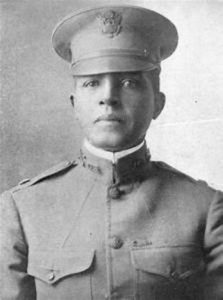
Charles Young
*Charles Young was born on this date in 1864. He was a Black soldier, musician, and writer.
Born in Mayslick, Kentucky, his family moved to Ripley, Ohio, when he was nine months old. His grandmother educated young until age 8; she was the 1st Black woman licensed to teach in that section of the country. Young graduated from high school at 16 and (through examination) won a placement at West Point. In 1889, he graduated from West Point as a commissioned Second Lieutenant of Cavalry, Armed Forces of the United States. He was the third Black man to graduate from West Point then. He was appointed Professor of Military Science and Tactics five years later at Wilberforce University.
Skilled in Mathematics, French, Latin, Spanish, and German, Young was promoted to Captain in 1901 and sent to the Philippines. He was also appointed as Military Attache in Haiti from 1904 to 1908. He joined his 9th regiment and commanded a squadron of two troops. Four years later, he was again selected for Military Attache duty, this time to Liberia. He was awarded the NAACP's Spingarn Medal for his service as an adviser to the Liberian Government and his supervision of building the country's infrastructure. Young authored a drama, "Toussaint L'ouverture", and an Essay "Military Morals of Races". He played many instruments, from the Flute to the Harp, and composed 103 short poems, including "Song Wing" and "A Troopers Burial."
He attained the rank of Major in 1912, the same year he joined Omega Psi Phi Fraternity Inc. He was appointed Lieutenant Colonel four years later, on July 1, 1916. Young was forced into premature retirement. In response, he rode a horse from Xenia, Ohio, to Washington, D. C, to prove he was physically fit for active service during WW I. Too weak to command in France, they said, but not too weak to traverse and suffer the swamps of West Africa, Colonel Young was again assigned to Liberia as Military Attache. He died at that post on January 8, 1922, while on a research expedition in Lagos, Nigeria.
Colonel Charles Young's funeral service was one of the few ever held at the Memorial Amphitheater at Arlington National Cemetery. Colonel Charles Young's home is scheduled to become the future site of the National Museum of African American Military History. Its unique history relives the days when it was a way station for the Underground Railroad.